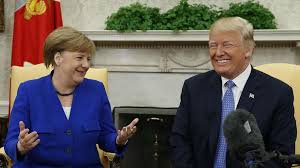Germany is poised to renege on its promise to boost NATO spending, backtracking on a public commitment last year by Chancellor Angela Merkel to increase German military expenditure to 1.5 percent of gross domestic product by 2024 – bringing it closer to the 2 percent level set by NATO themselves, according to the Wall Street Journal.
If confirmed at a cabinet meeting on Wednesday, the move would mark a fresh step in the gradual estrangement between the US and its erstwhile loyal European ally and comes after Mr. Trump’s repeated attacks of North Atlantic Treaty Organization leaders for not meeting a 2 percent military-spending target. –WSJ
Berlin currently spends around €43 billion ($49 billion), equal to just over 1.2 percent of GDP on defense. Under a new plan unveiled on Monday by the finance ministry, the spending would rise to just 1.37 percent of GDP next year, then decrease again to 1.33 percent in 2019, 1.29 percent in 2022 and 1.25 percent in 2023.
“The commitment we have made to NATO states that spending should reach 2 percent if the budget conditions allow for it. We haven’t abandoned the target but it remains a challenge that the federal government wants to master,” said a senior government official.
Berlin’s change of heart is the second recent rebuke of President Trump – who publicly embarrassed Germany during a July 2018 bilateral breakfast over their reliance on Russian energy.
Germany is “captive of Russia because it is getting so much of its energy from Russia,” said Trump, adding “The former Chancellor of Germany is the head of the pipeline company that is supplying the gas.”
“Ultimately Germany will have almost 70 percent of their country controlled by Russia with natural gas. So you tell me, is that appropriate?” Trump asked. “It should have never been allowed to happen. So Germany is totally controlled by Russia.”
Berlin has not taken kindly to Trump’s rhetoric, which includes criticism over Germany’s decision to let Chinese technology giant Huawei build their next generation 5G mobile network.
“NATO members clearly pledged to move towards, not away, from 2 percent by 2024. That the German government would even be considering reducing its already unacceptable commitments to military readiness is a worrisome signal to Germany’s 28 NATO allies,” said the US ambassador to Germany, Richard Grenell.
France goes the other way
Speaking at the Atlantic Council in Washington, French armed forces minister Florence Parly said Monday that France “Fully support[s] the US insistence on the 2 percent,” adding that French President Emmanuel Macron suggested that Europeans might enshrine this objective in a treaty.
That said, Parly also knocked the United States for what she described as an increasingly transactional relationship with allies.
“NATO’s solidarity clause is called Article 5, not Article F-35,” said Parly, adding “I’m personally more concerned at the notion that the strength of NATO solidarity might be made conditional on allies buying this or that equipment. The alliance should be unconditional, otherwise it’s not an alliance.”
Last year, Trump said he was willing to help smaller, less-wealthy countries purchase US weapons.
‘We are not going to finance it for them but we will make sure that they are able to get payments and various other things so they can buy — because the United States makes by far the best military equipment in the world, the best jets, the best missiles, the best guns, the best everything,’ he said at a news conference.
In his most recent budget proposal, Trump has also sought to revive a failed effort from the early days of the administration to offer flexible loans to countries to help them purchase everything from trucks to military training to fighter jets and drones. –Defense One
To help smaller countries buy US military equipment, a State Department official said that it would be seeking up to $8 billion to “make US defense equipment a more competitive and more affordable option for partner countries.”
Reprinted with permission from ZeroHedge.


